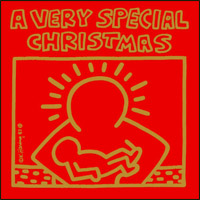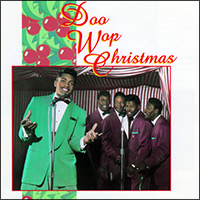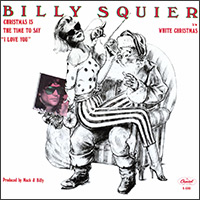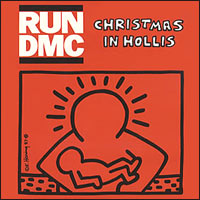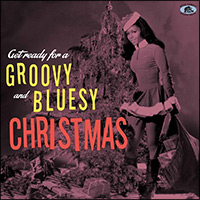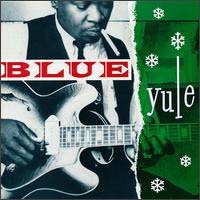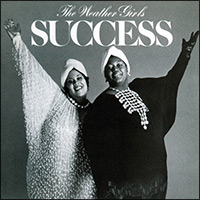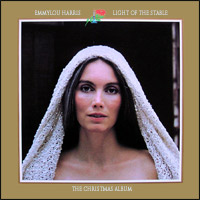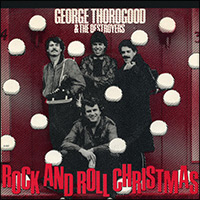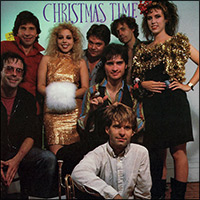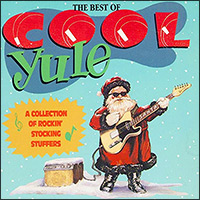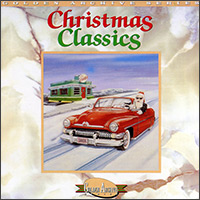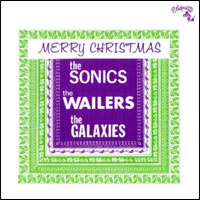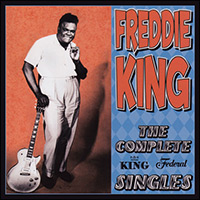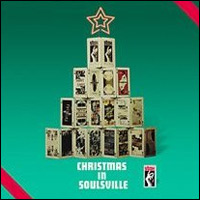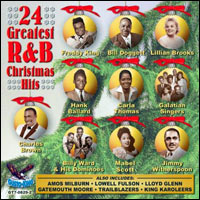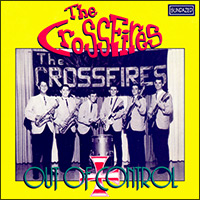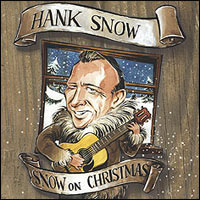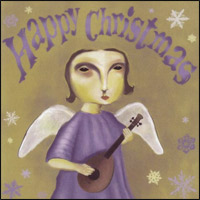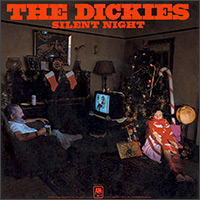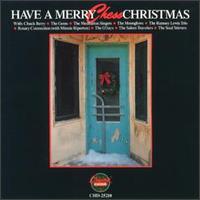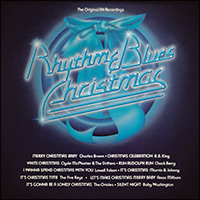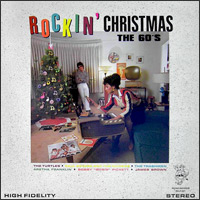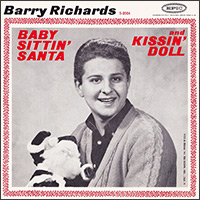
Top 100 Christmas Songs
...and counting
- I Saw Mommy Kissing Santa Claus, John Mellencamp (A&M, 1987)
The cute-but-annoying "I Saw Mommy Kissing Santa Claus" dates back to 1952, when little Jimmy Boyd made it a pop sensation. It's been covered hundreds of times, including popular versions by Theresa Brewer, Spike Jones, Perry Como, the Four Seasons, the Ronettes, and the Jackson 5. It's been parodied by Homer & Jethro ("I Saw Mommy Smoochin' Santa Claus") and Kip Addotta ("I Saw Daddy Kissing Santa Claus"), and Boyd himself recorded "I Saw Mommy Do The Mambo (With You Know Who)" two years after the fact.
I chose to spotlight John Mellencamp's version - originally released on the overrated but widely-praised A Very Special Christmas - because it steers clear of the novelty and delivers a rootsy performance as convincing as any the celebrated Hoosier ever waxed. One of Mellencamp's mentors, John Prine, had recorded the song to kick off his Oh Boy! label in 1984, and that version served as a blueprint for Mellencamp's own reading. But, in 1987, the former Johnny Cougar was at the culmination of his most fertile period (his tremendous Lonesome Jubilee was released the same year), and the spirit with which he and his band reinvent Boyd's trifle is impressive. Infusing their arrangement with hints of cajun, bluegrass, and rockabilly, they achieve a sort of novelty nirvana that renders Santa's illicit lip-lock all but irrelevant. [back to list]
- Jingle Jangle, Penguins
(Mercury, 1955)
The Penguins achieved immortality on tiny Los Angeles-based label Dootone with 1954's "Earth Angel (Will You Be Mine)," a sublime doo wop classic that topped the R&B charts before becoming one of the first rhythm & blues hits to cross over, reaching #8 on the pop charts. That success led them to mammoth Mercury Records, where they promptly slid into obscurity. Before they did, they cut "A Christmas Prayer," a snoozer ballad written by the group's manager, Buck Ram, backed with a Latin-tinged, sax-driven rocker "Jingle Jangle," written by the Penguins' baritone, Curtis Williams. Predictably, the b-side was the one that emerged as the classic, with its irresistible beat overwhelming the somewhat innocuous lyrics (every Christmas party needs some good dance music). "Jingle Jangle" is available on Rhino's Rockin' Christmas: The 50's and Doo Wop Christmas, among others, but you'll have to buy Best Of The Penguin: The Mercury Years if you want both sides of the single. [back to list] - Christmas Is The Time To Say I Love
You, Billy Squier (Capitol, 1981)
One of my favorite things about Christmas rock 'n' roll is its tendency to make otherwise unexceptional artists record exceptional Christmas songs. Folks tend to loosen up and let their hair down when recording holiday music, and the effect can be liberating for artists whose pretensions or lack of talent usually get in the way. Bryan Adams, for instance, has recorded two fine (if simple-minded) Christmas songs, and Blink 182, Foghat, and Emerson Lake & Palmer are among those whose Christmas records are far superior to their usual drivel. Billy Squier's "Christmas Is The Time To Say I Love You" is the single best example of this phenomenon, a contagiously exuberant sing-along that makes "The Stroke" sound like a bad imitation of Queen - which, well, it is.
"Christmas Is The Time To Say I Love You" was first released as the b-side of Squier's hit single, "My Kind Of Lover," and it was reissued in 1983 backed with Squier's 1982 recording of "White Christmas." In that format, "Christmas Is The Time To Say I Love You" charted #9 on Billboard's Christmas chart in 1984. Later, it was included on Priority's Christmas Rock Album (1986), Billboard Rock ‘n' Roll Christmas (1994), and VH1: The Big 80's Christmas (2001). [back to list]
- Christmas in Hollis, Run-D.M.C. (A&M,
1987)
Is it hyperbole to call Run-D.M.C. the first superstars of rap? With all due respect to Grandmaster Flash and Kurtis Blow, I think not. And, it's certainly no exaggeration to call "Christmas In Hollis" the greatest holiday rap song of all time. Run-D.M.C. were at their creative peak when they recorded "Christmas In Hollis," and it has everything anyone could ask for from a rap song - a great story, clever lyrics, Black pride, and an irresistible beat built on a classic soul sample - Clarence Carter's 1968 single "Back Door Santa." Maybe you would argue with calling it the greatest, but "Christmas In Hollis" certainly set the standard for future holiday rap tracks, and it's been covered and adapted many times since - even sampled by other rappers.
More than most Christmas rap records (or at least with more dignity), Run-D.M.C.'s "Christmas In Hollis" places the traditions of the season comfortably within the Black experience. Rather than seeing the holiday in terms of what they don't have (or didn't have when growing up in Queens, New York), Jam Master Jay and the boys celebrate Christmas from an Afrocentric perspective. For Christmas dinner, "Mom's cookin' chicken and collard greens," and later they'll "bust Christmas carols." For Run-DMC, good things happen at Christmas time: When Run returns Santa's wallet after he drops it in the park (while walking his "illin' reindeer"), Old St. Nick lets him keep the cash as a reward! The rappers are "chillin' just like a snowman," succeeding at being bad (as in cool) without being bad (as in naughty). Good for them!
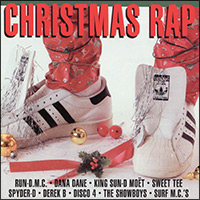 Initially, "Christmas In Hollis" was released in several formats, including as Profile Records 7-inch and 12-inch singles, and on Profile's Christmas
Rap album. Most famously, it was included on the inaugural edition of the Very Special Christmas series (read about it), and Run-DMC recorded another yule tune, "Christmas Is," for A
Very Special Christmas 2. Later, it was compiled on Together
Forever: Greatest Hits 1983-1991 (1991), Greatest
Hits (2002), and pretty much every Run-D.M.C. hits collection ever since. In 1998, Arista Records released "Christmas In Hollis" on a special, clear promotional CD single (click to see) in anticipation of the group's comeback album, planned for release in 1999. However, tensions within the group led to the album being delayed, and the resulting album, Crown
Royal, would not be released until 2001 with limited contributions by Darryl "D.M.C." McDaniels - making the CD single quite the collector's item...
Initially, "Christmas In Hollis" was released in several formats, including as Profile Records 7-inch and 12-inch singles, and on Profile's Christmas
Rap album. Most famously, it was included on the inaugural edition of the Very Special Christmas series (read about it), and Run-DMC recorded another yule tune, "Christmas Is," for A
Very Special Christmas 2. Later, it was compiled on Together
Forever: Greatest Hits 1983-1991 (1991), Greatest
Hits (2002), and pretty much every Run-D.M.C. hits collection ever since. In 1998, Arista Records released "Christmas In Hollis" on a special, clear promotional CD single (click to see) in anticipation of the group's comeback album, planned for release in 1999. However, tensions within the group led to the album being delayed, and the resulting album, Crown
Royal, would not be released until 2001 with limited contributions by Darryl "D.M.C." McDaniels - making the CD single quite the collector's item...Later, Sony Legacy added "Christmas In Hollis" to the 2005 deluxe edition of the group's 1988 album, Tougher Than Leather. And, of course, "Christmas In Hollis" pops up with regularity on Christmas collections like The Soulful Sounds Of Christmas (2006) and The Classic Christmas 80's Album (2015). [back to list]
- Santa Claus Is Coming, Hank Ballard & The
Midnighters (King, 1963)
Despite having some wonderful records - several of them hits - Hank Ballard is best remembered for having been the man who fell off the "Twist" bandwagon. Ballard wrote and recorded "The Twist," releasing it as the b-side to his Top 10 "Finger Poppin' Time" in 1960. His version made the Top 30 just weeks before Chubby Checker's more celebrated cover entered the charts in August 1960, and zoomed towards #1. Checker's record officially kicked off the dance craze that held sway in America for several years, and poor Hank Ballard was left (relatively speaking) in the dust. Chubby Checker's "Twist" actually reentered the charts in 1961 and made #1 again - the only record other than Bing Crosby's "White Christmas" ever to do so.
So in 1963, when Ballard released "Santa Claus Is Coming" - which has no sexual overtones, despite what some wags insinuate - he was all but past his prime, and the record made little splash. It's a peach of a platter, though, all blaring sax and driving beat, focusing nevertheless on Ballard's exuberant vocal and lyrics, which anticipate the arrival of St. Nick with child-like innocence. Backed with the powerful, James Brown-styled ballad, "Christmas Time For Everybody But Me," it stands as one of the greatest lost 45's in the history of Christmas rock. Both sides of the single were included on Hollywood's hard-to-find, poorly-constructed Rhythm & Blues Christmas, as well as on Bear Family's Get Ready For A Groovy And Bluesy Christmas (2024). [back to list]
- Christmas Day, Detroit Junior (Foxy, 1960)
Detroit Junior's "Christmas Day" shows up on a lot of Christmas lists (such as my Top 100) thanks to its inclusion on a couple of high-profile compilations, Rhino's Blue Yule and Columbia's Christmas Party With Eddie G. The listmakers act too-cool-for-school, failing to mention that they (and most everyone else) were clueless about Detroit Junior and his festive stomper prior to these reissues. "Christmas Day" was one damn obscure record, known only to hardcore collectors (like Eddie Gorodetsky, who compiled the Christmas Party CD) before the age of the compact disc, and little is known about Detroit Junior. In fact, neither Christmas Party nor Blue Yule mentions him or his song in their liner notes.
My research revealed that Detroit Junior was born Emery Williams Jr. on October 26, 1931, in Haynes, Arkansas. Later, he migrated to Detroit (hence, the name), but by 1956, he had moved to Chicago at the behest of Chess Records bluesman Eddie Boyd. Detroit Junior recorded one single in 1960 for Chess ("Too Poor") before jumping to Bea & Baby Records ("Money Tree," his best known record) and Foxy, where he waxed "Christmas Day" before year's end. Later, he recorded more singles for Chess, and he cut "Call My Job" (later a hit for Albert King) on U.S.A. Records in 1965. Ultimately, Junior settled in Chicago and continued to work steadily (including sessions for Alligator and Delmark) until shortly before his death in 2005.
Over the years, Emery Williams also backed a number of notable blues artists, including Eddie Taylor and Howlin' Wolf, earning a reputation for exuberant, hard-driving barrelhouse piano. Problematically, though, no sources confirm that Williams actually is the same person who recorded "Christmas Day" - though it seems highly likely. The record is certainly hard-driving and exuberant, but, musically speaking, it's closer in feel to Gary U.S. Bonds than Howlin' Wolf (and features very little piano). "You know, I feel so good!" Junior exclaims at the outset. If you follow his lead ("I got a pocketful of money and my baby by my side") and his instructions ("I want you to turn up your hi-fi, turn it up loud!"), I'll bet you'll feel pretty good, too. [back to list]
- Santa Claus Is Coming To My House, Karla DeVito, (Epic, 1982)
Karla DeVito was cute as a bug and possessed a voice the size of a house when she emerged fully formed on an unsuspecting pop scene in the early 80's. Sadly, the world proved unready for a brash, quirky, diminutive howler from New York City. That would all change when Cyndi Lauper broke large just a few years later - doing largely the same shtick - but Karla DeVito's recorded output would slow to a trickle after a brief period of notoriety. She recorded just two albums, served a stint in Broadway's Pirates Of Penzance, and, perhaps most famously, stood in for singer Ellen Foley, Meatloaf's fiesty foil in "Paradise By The Dashboard Light" - both on tour and in the video.
Karla Devito's debut LP, Is This A Cool World Or What? (1981), was a brilliant pastiche of new wave rockers, big-hair ballads, and theatrical melodramas - a lost classic, in my mind, at least. "Santa Claus Is Coming To My House" was released the following year as a non-LP single, and it threw yet another style into the musical blender - jump blues. Written and produced by DeVito and her husband, actor Robbie Benson, "Santa Claus" was an irresistible flute of bubbly camp. The song tells a sexually-charged tale with a surprise ending worthy of O. Henry.
Claiming she's been nice (but sounding very naughty), Karla confesses, "Even though it wouldn't be right, I want Santa Claus to come and stay all night!" The sassy Ms. DeVito tries to seduce ol' Santa ("Put down your bags and kiss me!"), only to have him counter propose, "Karla, let's trade gigs for a day!" Santa Claus wants Karla to deliver toys so he can jam with her band - which he proceeds to do with much abandon. So, while Santa toots his own horn at Karla's house, she grabs "the keys to his sleigh," and now Karla's coming to your house - lucky you! It's an unforgettable performance, but it's lost to the ages - never reissued in the digital age and long out-of-print. [back to list]
- Dear Santa (Bring Me A Man This Christmas), Weather Girls (Columbia, 1983)
Known as Two Tons O' Fun when they served as backup singers for gay icon Sylvester, the happily zaftig Weather Girls (Martha Wash and Izora Rhodes) played a prominent role in the outing of Queer music - both with this horny holiday hit and with "It's Raining Men" (1982), an anthem of the final few, giddy moments before AIDS hysteria put a damper on no-holds-barred gay sex. The brief success of the Weather Girls also coincided with the sudden transformation of disco music from mainstream obsession to cult phenomenon (it went back in the closet, you might say). Regardless, disco is undeniably what "Dear Santa (Bring Me A Man This Christmas)" is. After a minute or so of rhapsodic introduction, the beat kicks in and the man-chasing commences. Like the best gay anthems, though, "Dear Santa" swings both ways. When Martha Wash - pleading with Santa for a little satisfaction - sings "look at me, I'm on my knees," the gay audience heard validation of their sexual habits, where the rest of us just thought she was begging.
Written by Paul Shaffer (soon to be David Letterman's bandleader) and producer Paul Jabara, "Dear Santa" was taken from the Weather Girls' Columbia album Success (1983) and issued as both a 7- and 12-inch single. Sadly, it did not chart, but it's been spicing up my holidays ever since. For many years, it was seldom included on Christmas compilations, but it usually shows up alongside "It's Raining Men" on Weather Girls' collections like Super Hits (2000), and it's become pretty common in the annual wave of European holiday hits packages. Martha Wash, by the way, went on to sing some of the biggest dance hits of the 90's, including Black Box's "Everybody Everybody" and C+C Music Factory's "Gonna Make You Sweat Now" - often uncredited - before striking out on a solo career. [back to list]
- Light of the Stable, Emmylou Harris (Reprise, 1975)
A number of my Top 20 Christmas albums (including those by Vince Guaraldi, John Fahey, and Ray Charles) are not represented on my Top 100 Christmas songs list. In part, that's because no single track leaps to the fore. Those albums are are best heard as a whole. They just aren't pop records, and it's pop records that generally yield the great singles. Emmylou Harris' Light Of The Stable (1979) very nearly falls into this category. Taken in its entirety, it's overwhelmingly great. Parsed out one song at a time, it loses some of its power.
However, the title song of Light Of The Stable (released as a Reprise single four years prior), stands perfectly well all by its lonesome. An original song (written by Canadians Steven and Elizabeth Rhymer), it captures the timeless quality of a classic carol, sounding as old as the hills and as new as freshly fallen snow. It's a simple song celebrating the birth of Christ, and producer Brian Ahern gives it the perfect arrangement - simple, spare, swelling to a rousing, if restrained, finale. Supported by a who's who of progressive pickers (including James Burton, Glen Hardin, Rodney Crowell, Hank DeVito, and Emory Gordy, Jr.), Harris' performance is a wonder of restrained emotion - almost always a hallmark of great country music. Together, Emmylou, Neil Young, Dolly Parton, and Linda Ronstadt harmonize like a band of herald angels, announcing the coming of the savior with an innocence and hope that is truly evangelical.
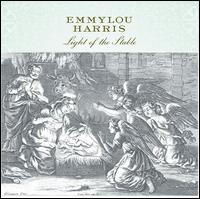 All that said, the single kind of stiffed, topping out at #99 on Billboard's country chart. But, its acoustic, bluegrass-inspired arrangement set the tone when Harris
and Ahern recorded the rest of Light
Of The Stable in 1979. The album employed many of the same players, who had since coalesced into the Hot Band that would accompany Harris for many years, both on stage and on record.
All that said, the single kind of stiffed, topping out at #99 on Billboard's country chart. But, its acoustic, bluegrass-inspired arrangement set the tone when Harris
and Ahern recorded the rest of Light
Of The Stable in 1979. The album employed many of the same players, who had since coalesced into the Hot Band that would accompany Harris for many years, both on stage and on record.Light Of The Stable has been repackaged several times throughout the years. It was first released by Warner Brothers in 1979 in much of the world (but not America) with a different cover than the iconic, Madonna-like portrait of Emmylou that's become so emblematic of the album. That edition was released in the United States in 1980, but the cover art was changed yet again when the album was reissued on compact disc in 1992 - this time using a contemporary portrait of Emmylou by a Christmas tree. In 2004, Rhino Records released a 25th anniversary edition with three newly recorded tracks and artwork based on the original "Light Of The Stable" 7-inch picture sleeve - but, weirdly, no pictures of Emmylou. [back to list] [learn more]
- Rock And Roll Christmas, George Thorogood & The
Destroyers (EMI America, 1983)
One can almost imagine George Thorogood sitting around, counting those royalty checks from "Bad To The Bone," thinking to himself, y'know, George (being a big rock star now, he could address himself in the third person), no one's ever done a song called "Rock And Roll Christmas." And he was right - amazingly, no one ever had. At least, no one ever had a hit record with it. So, when the executives at EMI wanted a little something extra in their stockings, history - and this song - was written. Despite the calculated nature of the exercise, Thorogood's little year-end dividend works darn well. Setting rock lyric clichés ("I want a Chuck Berry record and picture of Elvis") to rock music clichés (a churning, bar-band beat not unlike, well, Chuck Berry or Elvis), Thorogood somehow makes it all sound quaint, charming, and a whole lot of fun. Which, I should add, is not unlike his other records, and it's a strategy that made the Delaware native millions. Eventually, someone had to do it, and George Thorogood - seen at the time as a hero by working class rock fans - was the right man for the job.
Having said all that, the song wasn't a hit. It appeared only as a 7-inch single backed with the raucous "New Year's Eve Party," and it spent several years wandering the desert until it started to show up on compilations like Billboard Rock 'n' Roll Christmas (1994), VH1: The Big 80's Christmas (2001), Southern Rock Christmas (2002), and Classic Rock Christmas (2015). In 2022, it appeared on a digital collection of his hits, The Original George Thorogood. [back to list]
- Christmas Time, Chris Stamey Group with the dB's (Coyote, 1985)
Two tracks from Chris Stamey's Christmas Time appear in my Top 100 Songs: Stamey's "Christmas Time" and the dB's "Holiday Spirit." (Stamey is a member of the dB's, and they appear on both tracks.) The dB's song is more of a statement than a song - not even two manic minutes of unreserved cynicism and greed - but I love it. "Christmas Time," though, is a real artistic achievement and - in many ways - the better song. It is certainly a more sophisticated composition and fully realized recording. And, it's a virtual paean to Big Star, whose classic "Jesus Christ" also appears on the album. From the letter-perfect power pop arrangement (chiming guitars, soaring harmonies, thundering drums) to the inventive way Stamey rewrites holiday homilies in his lyrics, "Christmas Time" bores its way into the subconscious and will not let go.
It's a long story, but Christmas Time has been issued four separate times (and counting), each time with a different track listing. The title song, obviously, appears on all of them, and "Holiday Spirit" is included on the CD editions by East Side Digital (1993), Collector's Choice (2006), and Omnivore (2015).
Interestingly, a green vinyl single issued in 1986 also credits "our pal, Syd Straw." A supremely talented vocalist, Straw would later contribute a track to the 1993 edition, but she is never credited with adding vocals to "Christmas Time" on any of the vinyl or CD editions of the album. On the single, the song is labeled the "Airside Remix," and that makes me think Syd's vocals (and the remix) are exclusive to that pressing - a collector's item if there ever was one! [back to list] [learn more]
- Christmas In The Congo, Marquees (Warner
Brothers, 1959)
The Marquees were a doo wop group from Los Angeles, but my research has uncovered little else about the 1959 sessions for Warner Brothers where they recorded two marvelously twisted Christmas songs, "Santa Done Got Hip" and "Christmas In The Congo." Suffice to say, they did, and from what's printed on the original 7-inch record label, we know that the group was backed by "The Big Sound Of Don Ralke," a bandleader who also recorded for Warner Brothers. And, "Santa Done Got Hip" was written by Bob and Richard Sherman - the same Sherman Brothers who wrote many of Walt Disney's most famous songs. Reportedly, Bob Sherman also managed the group. By all appearances, however, this Marquees is not the Marquees that became the "New Moonglows" in 1957, nor are they any one of several other groups recording under the same name around the same time.
Regardless, "Christmas In The Congo" is my favorite of the two songs, if only because its arguably racist concept was gleefully plagiarized by songwriters Irving Botkin and Ric Masten (two white guys) from the Cadets' 1956 doo wop classic, "Stranded In The Jungle." It's the sort of record that might make contemporary black listeners squirm uncomfortably, but to me (another white guy) it sounds like innocent fun. In my defense, the Marquees were all black, and they don't appear to have had a problem with it.
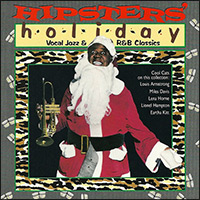 "Merry Christmas, B'wana!" the record begins as the Marquees
launch into the rhythmic rites of "the Pygmy tribe" - and it just gets less dignified
from there. Santa Claus is coming to the jungle, so "that must be why the natives
are restless tonight." In addition to blow guns and canoes, however, the Pygmies ask Santa for "four picture tubes, three golf carts, two Cadillacs, and a TV dinner for
two." Those Pygmies sho' nuff know how to party! So, "beat on your bongo, tell
Santa what to bring," and let Scrooge worry about what's politically correct.
"Merry Christmas, B'wana!" the record begins as the Marquees
launch into the rhythmic rites of "the Pygmy tribe" - and it just gets less dignified
from there. Santa Claus is coming to the jungle, so "that must be why the natives
are restless tonight." In addition to blow guns and canoes, however, the Pygmies ask Santa for "four picture tubes, three golf carts, two Cadillacs, and a TV dinner for
two." Those Pygmies sho' nuff know how to party! So, "beat on your bongo, tell
Santa what to bring," and let Scrooge worry about what's politically correct.Neither song is easy to locate, but "Christmas In The Congo" can be found on Rhino's The Best Of Cool Yule (1988), and "Santa Done Got Hip" is on the same label's Hipsters' Holiday. More recently, Warner Brothers reissued the single for download and streaming. [back to list]
- Twistin' Bells, Santo & Johnny (Canadian
American, 1960)
The Brooklyn-born Farina brothers stumbled upon immortality in 1959 with "Sleep Walk," a #1 pop hit and indisputably one of the greatest rock instrumentals ever. Santo's soaring steel guitar captured a sort of Duane-Eddy-goes-Hawaiian vibe that will forever be linked to soulful walks on the beach and steamy backseat make-out sessions. With "Twistin' Bells," however, Santo & Johnny went an entirely different direction. Capitalizing on the "Twist" craze that followed in the wake of Chubby Checker's 1960 chart topper, the brothers set "Jingle Bells" to a hip-shaking dance beat, this time emphasizing Johnny's insistent rhythm guitar almost as much as Santo's slide work. It's an irresistible little record, memorable for its boundless energy more than its musical innovation.
"Twistin' Bells" was issued as a non-LP single on the little Canadian American label and rose to #49 on Billboard's Hot 100. It was reissued in 1961 as the b-side of Linda Scott's "Christmas Day," then reissued again in 1962. It appears with some frequency on holiday collections like Rhino's Christmas Classics (1988) and Bear Family's Yulesville! (2019), as well as on The Best Of Santo & Johnny (1997). For the incurable collector, Santa & Johnny have another holiday single, "Bianco Natale" (aka "White Christmas"), issued on 45 in 1967 - but only in Italy, where the boys were quite popular thanks to their ethnic heritage. Much later, Johnny Farina released his own holiday album, Christmas Mine, in 2003. [back to list]
- Christmas Spirit?? Wailers (Etiquette, 1965)
There's never been a more sour Christmas single than the Sonics/Wailers split 45, "Don't Believe In Christmas" b/w "Christmas Spirit??" The a-side featured the Sonics railing against the entire institution of Christmas - largely for personal reasons - and it's another of my Top 100 picks. The Wailers' flipside attacks the holiday for what it reveals about America - our commercialism, our shallowness, our lack of self-awareness. Told in a droll, Dylanesque twang, "Christmas Spirit??" is so broad, so bitter, so altogether over-the-top that it just may have been intended as a parody. Or, it may have been an earnest attempt at relevance by an aging party band whose biggest hit was "Tall Cool One" back in 1959. Either way, it works for me - bah humbug, babe. Both sides of this infamous single are included on Etiquette's Merry Christmas From The Sonics, The Wailers, The Galaxies, a compilation of garage bands from the Pacific Northwest, as well as Rhino's Bummed Out Christmas. [back to list] [learn more] - Christmas Tears, Freddie
King (Federal, 1961)
Here's a song whose relative obscurity was long a mystery. Starting with Top 10 R&B hits like "Hide Away" and "I'm Tore Down," Freddie King was a popular guy - and one of the most respected modern blues guitarists. And, he released "Christmas Tears" (backed with "I Hear Jingle Bells," an uptempo number arguably as good as the slow blues on the front side) through Federal Records, an independent label of some renown. In fact, it was a hit, too, reaching #26 on the R&B charts. Yet, for years the few reissues of this nugget have all been crappy CDs on ultra-budget imprint Hollywood Records (read about it), all mastered from scratchy vinyl - not from the original master tapes. That said, "Christmas Tears" is a show-stopper of a song, a classic twelve-bar blues of loss and longing that just happens to be set during the holiday season. "I hear sleigh bells ringing," King mourns, "but I haven't heard a word from you in years." Punctuating his lament with stinging, single-string leads, Freddie admits, "I'm just sittin' here cryin' Christmas tears."
In the years since I wrote the first draft of my Top 100 Songs, things have improved considerably for King and his fine single. A few high-profile covers have raised the visibility of "Christmas Tears," including Eric Clapton's on A Very Special Christmas 4 (1999) and Lucinda Williams' on Have Yourself A Rockin' Little Christmas (2021). Most notably, however, Real Gone Music issued The Complete King/Federal Singles in 2013, capturing the a- and b-sides of Freddie King's numerous singles between 1960 and 1967 in stunning clarity, including both "Christmas Tears" and "I Hear Jingle Bells." [back to list]
- Santa Claus Wants Some
Lovin', Albert King (Stax, 1974)
Many Christmas songs have blended the sacred and profane, creating a sexual feast where once there was just turkey and cranberry sauce. But, no yuletide lothario has ever been quite as blunt as bluesman Albert King in his 1974 single, "Santa Claus Wants Some Lovin'." His sensuous guitar lines are but a harbinger of the hardcore jollies King hopes to unleash as he all but demands satisfaction. Tough luck, though, as he complains, "I ain't had no lovin' and it's worrying me!" The cause? Albert and his woman are preoccupied with holiday preparations. He is "trying to fix this ol' bicycle" while "Mama's in the kitchen cooking." So, he plans to make his move before "Mama... gets that sleep in her eyes." True, "Christmas is for children," but King wants his wife to "make her Pappy happy... before the children wake." Sounds reasonable enough, but a good guitar solo is all the pleasure Albert receives before the record fades. Sadly, Santa Claus won't be coming tonight...
"Santa Claus Wants Some Lovin'" was released as a non-LP Stax single in 1974, about a year before the label was forced into bankruptcy. Not too surprisingly, King's horny masterstroke sank like a stone, and it wouldn't see the light of day until 1982, when the label - by then wholly owned by Fantasy Records - compiled It's Christmas Time Again. That album also contained a previously unreleased version of the song by its author, Mack Rice, probably recorded in 1972. Finally, be aware that King's recording exists in both a three-minute single edit and a four-minute album version. Most compilations use the stereo album version, including It's Christmas Time Again and Christmas In Soulsville (2007). The mono single version can be found on The Complete Stax/Volt Singles Vol. 3: 1972-1975 (1994) and The Definitive Albert King On Stax (2012). In 2023, a stereo single version finally popped up on Stax Christmas. [back to list] [learn more]
- Christmas (Comes But Once A Year),
Amos Milburn (King, 1960)
Jovial Amos Milburn liked to party, and it showed on classics like "One Scotch, One Bourbon, One Beer" and "Let's Rock A While." So, while his blues brothers usually spent their Christmas season bemoaning their lack of love or sustenance, Amos always had the best of times. Speaking to his lover on his 1949 single "Let's Make Christmas Merry Baby," he'd volunteered to "slide down your chimney and fill your stocking full of toys" (sounds innocent enough), then he offered a "ride on my reindeer" (just good clean fun, right?). On "Christmas (Comes But Once A Year)," released a decade hence, Milburn's got a house full of children (small wonder), but his mood remains almost as generous. "It'll take the next six months to pay these bills," he frets, "but I don't care - Christmas comes but once a year!" With such a healthy attitude to go with his healthy libido (he still wants "to have myself a ball"), Milburn's record runneth over with love.
"Christmas (Comes But Once A Year)" was originally released on King Records as the flipside of Charles Brown's timeless 1960 hit "Please Come Home For Christmas." And then, Brown included the song on his 1961 album, Charles Brown Sings Christmas Songs, using the exact same backing track as Milburn! Anyway, unlike "Let's Make Christmas Merry Baby" - recorded for Aladdin Records, now controlled by EMI and widely available - "Christmas (Comes But Once A Year)" is a rarity. Like the rest of the classic blues sides recorded for King, Federal, Hollywood, Swing Time and other labels now owned by philistine Gusto Records (read about it), "Christmas (Comes But Once A Year)" is usually found on horribly mastered, shoddily package compact discs like Rhythm And Blues Christmas (1988) and 24 Greatest R&B Christmas Hits (2007), plus public domain packages like Blues, Blues Christmas Vol. 3 (2013). The best-sounding master I've heard - and it's still pretty rough - is found on Living The Blues: Blues Christmas (1999), part of a lengthy Time Life series. [back to list] [learn more]
- Santa & The Sidewalk
Surfer, Crossfires (none, 1963)
The Crossfires were an early 60's surf rock band that transformed into the Turtles, the revered band responsible for "Happy Together" and many more sunshine pop classics. While the Crossfires are best remembered for tough surf instrumentals like "Fiberglass Jungle" and "Out Of Control," they featured Howard Kaylan and Mark Volman, a famously madcap duo who went on to perform with Frank Zappa as the Phlorescent Leech & Eddie (aka Flo & Eddie). Long before that, Kaylan & Volman's twisted humor came to the fore on the Crossfires' "Santa & The Sidewalk Surfer."
The scene: A department store Santa Claus is efficiently dispatching greedy tots until confronted with an avaricious, amateur skateboarder. The would-be sidewalk surfer unfurls a seemingly endless list of requirements for his new hobby, entreating Santa for everything from a "genuine Waimea Bun Buster Skateboard" to a "Fender electric twangy surf guitar" to peroxide, cut-off blue jeans, huarache sandals, and a subscription to Surfer magazine. On and on he goes till Santa finally breaks down in a paroxysm of ho ho ho's, amused by the surfer's last request - a box of band-aids for when he "busts his buns."
"Santa & The Sidewalk Surfer" was recorded for the b-side of a Christmas single, "Living Doll," that got scuttled for some reason - and both songs are tough to find. "Santa" sat unreleased until 1974, when Sire Records included it on their Turtles compilation, Happy Together Again. It also appeared on Rhino Records' Rockin' Christmas: The 60's (1984), and both songs appear on Sundazed Records' 1995 expanded CD reissue of Out Of Control, Rhino's 1981 collection of mostly unreleased Crossfires masters. [back to list]
- Reindeer Boogie, Hank Snow (RCA Victor,
1953)
Way before anyone had the bright idea to water down country music, someone decided to soup it up. Boogie woogie hoedowns like Hank Snow's supercharged 1953 Christmas single, "Reindeer Boogie," were briefly the rage in Nashville after World War II. These songs took the boundless energy of jump blues and married it to the timeless traditions of hillbilly music. Spade Cooley's "Three-Way Boogie" (1946), the Delmore Brothers' "Freight Train Boogie" (1946), and Tennessee Ernie Ford's "Shot-Gun Boogie" (1950) would be three fine prior examples, and Davis Sisters' "Christmas Boogie" - another Top 100 song - would emerge the following year. Needless to say, some folks frowned on that sort of musical integration, and cooler heads soon prevailed. Well, in Nashville at least. Elvis Presley and the rest of the country went another direction. "Reindeer Boogie" remains, though - all frantic fiddles and hot guitars, while Santa commands his team to "limber your legs and sharpen your hooves" and "get hepped up for that midnight race." Hot damn, I'll follow that lead!
"Reindeer Boogie" was released both as a single (it did not chart) and as part of A Country Christmas With Hank Snow, a 7-inch EP in a die-cut, ornament-shaped sleeve - one of many released by RCA Victor around the same time. It was billed, formally speaking, to Hank Snow, The Singing Ranger, and The Rainbow Ranch Boys. Snow would later record a full album called Christmas With Hank Snow (1967), which included a new recording of "Reindeer Boogie." The complete contents of both the EP and the LP are found on Bear Family's Snow For Christmas. The original 1953 recording can also be found on Rhino's Hillbilly Holiday (1988), and Bear Family's Christmas On The Countryside (2017), as well as The Singing Ranger (1988), the first of several massive Bear Family boxed sets documenting the entirety of Hank Snow's long, long career. [back to list]
- Away In A Manger, Plankeye
(BEC, 1998)
Little Christian label BEC Recordings released a series of albums entitled Happy Christmas that embodied many of the best qualities of two worlds: Christmas music and Christian rock. I appreciated the series more for the music than the message - a rare treat given the bathetic standard set by most religious music - and, as songs of the season, they held their own. True, the ska-pop-punk slant appealed to my bias, and some of it was pretty lukewarm, but a fair amount was genuinely good stuff. On the first volume, Plankeye, a now-defunct alternative rock band, unleashed a marvelous reinvention of "Away In A Manger." Loud, tuneful, and full of spirit, the band waxed a religious anthem of (nearly) universal appeal. To quote Sonny Columbus, "I'm not a big religion fan," but Plankeye helped me understand the importance of their faith (the ultimate goal of all evangelical music) and rocked like crazy while they did it. I'll say "amen" to that any day.
The first three volumes were later collected on Happy Christmas Redux (2010), and Plankeye's "Away In A Manger" is a strange bedfellow on Hip-O's irreverent collection, Sleighed: The Other Side Of Christmas (2000). [back to list]
 Honorable Mention
Honorable Mention
At one time, these songs were in my Top 100. They have been displaced by newer songs - or, more likely, older songs I've since discovered. Maybe someday I'll get to 200...
- Silent Night, Dickies (A&M,
1978)
The Dickies were (and still are) West Coast punk rock jokesters capable of backing up their sniggering musical wisecracks with blistering, buzzsaw riffs. They became renowned for destroying rock classics, among them Black Sabbath's "Paranoid" (1978) and the Moody Blues' "Nights In White Satin" (1979) - the latter being one of my all-time favorite cover versions. When it came time to skewer the traditions of Christmas, they chose a simple carol, "Silent Night." They approached the song in the manner to which they were accustomed. Mixing unparalleled fury with a surprising, agreeable dearth of sarcasm, they rushed headlong through the arrangement like their lives depended on finishing in under two minutes. With "Silent Night," they overshot the mark (2:20 to be exact), but their frenzied performance leaves you breathless all the same.
"Silent Night" was originally released in 1978 as an A&M white vinyl 45 backed with a similarly frenetic version of Simon & Garfunkel's "The Sound Of Silence," and it later appeared on Rhino's Punk Rock Xmas. Both sides of the single are included on the Dickies retrospectives like Great Dictations, The Punk Singles Collection, and The A&M Years, as well as the expanded CD version of their debut album, The Incredible Shrinking Dickies (later made available for download and streaming). [back to list]
- Christmas Ain't Christmas New Year's
Ain't New Year's Without The One You Love, The O'Jays (Neptune, 1969)
To the average radio head, the O'Jays seem to come out of nowhere in the early 70's with supercharged soul hits like "Backstabbers," "Love Train," and "For The Love Of Money." In fact, they'd been toiling for over a decade, scoring a string of minor pop and middlin' R&B hits before Eddie Levert and the boys signed to Philadelphia International Records and entered their halcyon days. Compared to their new music produced by the powerhouse team of Kenny Gamble and Leon Huff, "Christmas Ain't Christmas New Year's Ain't New Year's Without The One You Love" was just a quaint little record with a very long title. Nevertheless, it's a charming and soulful exploration of the relationship between Christmas and romance, catchy in an almost giddy way given the morose sentiment of the lyrics.
"Christmas Ain't Christmas" was released as a non-LP single by Philadelphia indie Neptune Records, which was, in fact, founded by Gamble and Huff. It was the immediate precursor to Philadelphia International, and it was distributed by another indie label, Chicago-based Chess Records, by then long past its prime. The song was also written and produced by Gamble and Huff and arranged by another Philly soul legend Thom Bell - which is to say, all the elements were in place, but they hadn't yet perfected the secret sauce. "Christmas Ain't Christmas" went nowhere upon initial release, but Philly International reissued it in 1973 following the O'Jays' breakthrough. Ultimately, "Christmas Ain't Christmas" became a minor holiday soul classic - a distant second to Donny Hathaway's "This Christmas" (see above), recorded the following year - later covered by Aretha Franklin, Bobby Womack, and Cher, among others.
"Christmas Ain't Christmas" never appeared on an O'Jays album, but it's been well-contextualized a few times. First came Have A Merry Chess Christmas (1988), a brief, eclectic collection from that label's vaults. Then, Rhino included on Smooth Grooves: A Sensual Christmas (1999), an album designed for romance, and Collectables included on their Ultimate Soulful Christmas Album (2001), a somewhat generic compilation tracing 30 years of black music. Finally, the O'Jays later recorded two Christmas albums, Home For Christmas (1991) and Christmas With The O'Jays (2010), neither of which displayed much of that old "Backstabbers" spark. [back to list]
- It's Christmas Time, Five Keys (Aladdin, 1951)
Though it often sometimes sounded like it came from Mars, doo wop didn't develop in a vacuum. The youngsters who created this immortal 50's style modeled themselves after vocal groups like the Ravens, Orioles, and the Five Keys. The close harmonies, careful modulation, and melancholy vibe of these groups' records bridged the gap between sanctified gospel singing, the stately black pop typified by the Ink Spots, and the wild, raucous rhythm 'n' blues that was bubbling up everywhere, stoked by post-war black ambition and social discontent. In the process, a genre was born. The Five Keys' "It's Christmas Time" couldn't be a more perfect example, with a coronet-like lead voice floating effortlessly above suave harmonies, returning invariably to a careful refrain of "ding dong." Add a beat and an attitude, and you've got rock 'n' roll. The Five Keys did essentially that, scoring hits in the mid-50's with ravers like "Ling Ting Tong," but their early classics (including "Glory Of Love") possess a grace they never surpassed.
"It's Christmas Time" was originally a failed Aladdin single, and it sat largely ignored until reissued on the foundational United Artists LP Rhythm & Blues Christmas in 1976. It later appeared on Rhino's Doo Wop Christmas (1992), EMI's Legends Of Christmas Past (1992), and Richard Weize Archive's Boogie Woogie Santa Claus: An R&B Christmas (2017), as well as Universal's digital collection, Lost Christmas 2 - Holiday Rarities (2015). [back to list]
- Mr. Santa Claus (Bring Me My Baby), Nathaniel Mayer (Fortune, 1962)
Nathaniel Mayer was a Detroit wild man, and his "Mr. Santa Claus (Bring Me My Baby)" is a screaming chunk of proto-soul, singular in its naked yearning. Recorded in a studio that possessed, one wag suggested, "the acoustics of a vacant house," this noisy record showcases Mayer's willingness to utterly prostrate himself before Ol' St. Nick. "Mr. Santa Claus, I want my baby!" he hollers over and over, adding "I'll never ask for anymore." Mayer then ticks off everything he doesn't want if only Santa will grant his plea. "I don't want no fancy clothes to hang on my back, I don't want no speedboat or a Cadillac." He makes a compelling case, and as the record fades in a flurry of drum fills and supplications, Mayer frantically announces (via telephone) that his baby has indeed returned - a happy ending to a harrowing tale.
Mayer is best known for "Village Of Love," a single released on Detroit indie Fortune Records in 1962. It reached #16 on Billboard's R&B chart and #22 on the Hot 100, but "Mr. Santa Claus" sank like a stone, and Mayer never again graced the charts. He and his band, the Fabulous Twilights, released several more singles on Fortune and one album, Going Back To The Village Of Love (1964), which included "Mr. Santa Claus." For reasons unknown, however, the Fabulous Twilights are not credited on the original "Mr. Santa Claus" 7-inch single - though it's a fair bet they played on it.
Anyway, after his run on Fortune, Mayer disappeared for many years. He resurfaced in the 21st century and enjoyed several years of prominence among the hipster cognoscenti before his death in 2008. During that time, he released a single for Norton Records in 2005 that included a raucous live version of "Mr. Santa Claus," recorded in Brooklyn, New York, in 2003, which was later compiled on A Christmas Gift To You From Norton Records, Vol. 2 (2019). The original version, sadly, is rather scarce. It was collected on Rhino's Rockin' Christmas: The 60's (1984), but it has since appeared mostly on public domain collections like Blink Before Christmas (2019) and Blues, Blues Christmas Vol. 6 (2021). It also appears on CD reissues of the Village Of Love, of which there have been several - all on small European labels. [back to list]
- Barry Richards, Baby Sittin' Santa (Epic, 1962)
I can't tell you much about Barry Richards, but his 1962 novelty single "Baby Sittin' Santa" is a lot of fun! By all appearances, Barry was a very young man when he recorded it, but he still does a pretty mean Elvis imitation. He essentially narrates the story of an encounter between Santa Claus and a loquacious infant, which culminates in the two doing the twist under the Christmas tree. The record is punctuated with baby talk - its main gimmick - but it's set to a fulsome rockabilly beat.
"Babby Sittin' Santa" was released as a non-LP Epic single, but I discovered it on an old Rhino LP, Rockin Christmas: The 50's (1984). It later appeared on a Sony compact disc, Reindeer Rock (1994), which not only captured a cleanly mastered digital transfer of the song, it also rescued the actual ending of the record - something Rhino had apparently (and inexplicably) edited out! After that, "Baby Sittin' Santa" started showing up on public domain collections like Rockabilly Xmas, but always in the inferior, clipped version. It later appeared on Sony's 1960's Christmas Classics (Sony, 2024), but again with the clipped ending.
Perhaps the most interesting thing about "Baby Sittin' Santa" is that it's based on an earlier record, "Baby Sittin' Boogie" by Buzz Clifford (Columbia, 1960). Both songs were written by Johnny Parker, a big band singer with Les Brown in the 40's who became a prolific songwriter in the 50's and 60's, and then turned music critic and historian. Epic and Columbia were sister labels, and both records are credited to the same arranger and conductor, Tony Piano. So, it's possible both use the same backing track - they certainly sound similar, though "Baby Sittin' Santa" has been sped up a bit. But, all the vocals - including the baby - are different.
 Again, as for Barry Richards, he's something of a mystery. I have unearthed no biographical data whatsoever. We know, however, that he recorded for more than a decade, cutting a dozen singles for almost as many labels, but only grazing the charts once. His 1974 A&M single, "Come Fill Your Cup Again," made it to #33 on Billboard's Adult Contemporary chart. Richards never managed to cut a full album, however, and he seems to have made his living as a songwriter, including some work with Bobby Hart of the famed singer/songwriter duo, Boyce & Hart. Richards placed songs with Herman's Hermits, Chuck Jackson, the New Christy Minstrels, Esther Phillips, and many others - though none seem to have been hits.
Again, as for Barry Richards, he's something of a mystery. I have unearthed no biographical data whatsoever. We know, however, that he recorded for more than a decade, cutting a dozen singles for almost as many labels, but only grazing the charts once. His 1974 A&M single, "Come Fill Your Cup Again," made it to #33 on Billboard's Adult Contemporary chart. Richards never managed to cut a full album, however, and he seems to have made his living as a songwriter, including some work with Bobby Hart of the famed singer/songwriter duo, Boyce & Hart. Richards placed songs with Herman's Hermits, Chuck Jackson, the New Christy Minstrels, Esther Phillips, and many others - though none seem to have been hits.Unlikely as it seems, Barry Richards earned a small spot in punk rock history when the Sex Pistols grew fond of covering his song "Don't Gimme No Lip, Child," which UK pop star Dave Berry recorded in 1964 as the b-side of his biggest hit, "The Crying Game." The Pistols' blistering version shows up on live albums and bootlegs and, most significantly, the soundtrack to the 1980 film The Great Rock 'n' Roll Swindle. [back to list]




